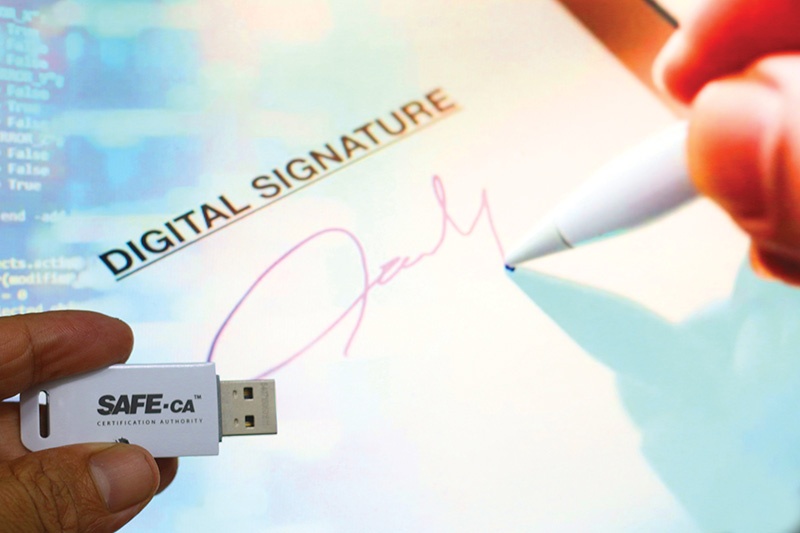Installing a robust e-signature model
 |
| Associate Dang Hoan My and legal assistant Truong Cong Thanh from law firm Indochine Counsel |
Vietnam has undergone a prolonged social distancing to reduce the spread of the virus and has thus restricted domestic and international travel. The difficulties caused by the resultant inability to travel and meet face to face has demonstrated the short comings of traditional methods for entering and executing contracts and other legal documents. Electronic signatures have been internationally recognized to be a suitable alternative as they allow execution of contracts without any hardcopy or meeting in person. Despite widespread acceptance internationally, Vietnam’s legal regime governing electronic signatures remains fragmented.
This article will address some of the issues facing electronic signatures under Vietnamese laws. Electronic signatures have been internationally recognised to be a suitable alternative as they allow execution of contracts without any hardcopy or meeting in person. Despite widespread acceptance internationally, Vietnam’s legal regime governing electronic signatures remains fragmented.
 |
| Installing a robust e-signature model |
Legal framework and definition of electronic signatures
E-signatures are primarily governed by the Law on Electronic Transactions 2005 as amended, of which digital signatures are further regulated by Decree No.130/2018/ND-CP dated September 27, 2018 on guidelines for the Law on E-Transactions of digital signatures and digital signature authentication.
Pursuant to the 2005 law, an e-signature is defined by the following criteria: it is created by electronic means; it is logically attached or associated to a data message (or in other words, an e-contract); and it is capable of certifying signatories of a data message and their approval to the content of a signed data message.
E-signatures are commonly used in the forms of digital signatures, scanned signatures, and image signatures. The definition of a digital signature, as the prominent subset of e-signatures, is further elaborated by Decree 130.
An e-signature will be recognised as legally secured and valid by the 2005 law if it satisfies identifiability (it solely attaches to the signatory in the context in which such data is used, and under the control of the signatory at the time of signing; and detectability (all changes in the e-signature, or those in the contents of the data message after the time of signing are detectable).
The 2005 law also provides a case where an e-signature is deemed to satisfy all of the above criteria, and accordingly deemed to be secured and valid, is when it is accompanied by a certification from an organisation providing e-signature certifying services.
Legal validity
Decree 130 provides that a digital signature shall be deemed secured and legally valid if it is certified by an organisation providing digital signature certifying services, and provided that such organisation is duly licensed by the Ministry of Information and Communications (MIC), known as the DS certifier. The list of DS certifiers is published on the website of the MIC. To date there are 14 licensed certifiers, none of which is a foreign organisation. This means that only digital signatures certified by domestic DS certifiers are legally acknowledged for use in Vietnam.
Scanned and image signatures face several concerns over their use due to the lack of detailed regulations and certifying mechanisms. Decree 130 only states that a digital signature is valid and secured when it is certified by a DS certifier, while regulations on certifying mechanisms for imaged and scanned signatures have yet to be promulgated.
Despite the fact that a scanned or imaged signature may be used in accordance with the 2005 law, a third party may still show concerns about the legal validity of scanned and image signatures, and therefore the authentication and reliability of the signed e-contract since there is no available method for cross-checking and easing the raised concerns. Even though parties to an e-contract are legally entitled to choose whether to use a certified e-signature or an imaged or scanned signature, the use of the latter is still less optimal than a digital signature.
The Ministry of Industry and Trade (MoIT) has recently issued guidance regarding the certification of e-contracts. Firstly, to amend Decree No.52/2013/ND-CP, the MoIT recently issued decree No.85/2021/ND-CP setting out a much more thorough legal ground for an organisation to register for the service of e-contract certification – a so-called certified e-contract authority (CeCA).
Secondly, the MoIT is also developing a centralised e-contract management system, where all e-contracts certified by domestic CeCAs, after being encrypted for confidentiality, will be uploaded for archival purposes. Finally, other third parties will be able to access such centralised e-contracts to retrieve, compare, and verify information of all e-contracts archived.
The operation of CeCAs and the establishment of a centralised e-contract managing system are expected to pave the way for ensuring the legality of an e-contract. While the validity and legality of e-contracts are ensured by using the services of a CeCA, parties will no longer be constrained to digital signatures but are free to choose other signing methods that they find convenient and familiar with.
This can be either by scanned and image signature or even other easy-to-use verifying methods such as eVerify, eKYC, or TimeStamp). In addition, by permitting the access of a centralised e-contract managing system for the purpose of verification, third parties will no longer need to raise concerns over the authentication and reliability of an electronically signed e-contract. However, this management system is still under development, and there has yet to be any official legislation.
Use outside Vietnam
Pursuant to Decree 130, when in need of concluding an e-transaction with an offshore partner, Vietnamese organisations or individuals are entitled to use foreign digital certificates only if the prospective offshore partner originates from a country that does not recognise digital certificates of Vietnamese DS certifiers. Otherwise, digital certificates and digital signatures of domestic DS certifiers will be used for signing.
However, upon international practice, for the e-signature of a nation being used abroad, countries and regions shall enter into bilateral or multilateral treaties to commit to acknowledging the validity of each parties’ e-signature. Yet Vietnam has not signed any treaties recognising foreign e-signatures or having its e-signature certification recognised in foreign countries, and as such, digital signatures of DS Certifiers are basically impossible to be used outside Vietnam.
With that being said, in case Vietnamese organisations or individuals are in need of concluding an e-transaction with an offshore partner, they may use a foreign digital certificate, provided that such foreign digital certificate is duly licensed for use in Vietnam or accepted for international transactions by the MIC. Although conditions and procedures for a foreign digital certificate to be licensed are already stipulated in Decree 130, there have not been any such licenses granted.
In practice, with the aim of overcoming the existing legal hurdle, there appears to be a collaboration between a certified e-contract authority in Vietnam and an offshore e-signature certifier for serving the needs for cross-border electronic signing. As the legal validity and security of digital signatures certified by such collaboration is still a contentious issue as it is not explicitly regulated by the laws of Vietnam, the use thereof may be challenged by any third party, governmental authority, or dispute settlement body. Any parties considering the use of digital signatures provided by such collaboration should be wary of those challenges by other parties and authorities.
Although e-signatures are unarguably the signing method of the future, there are still grey areas in applicable legislation hindering their use in Vietnam. While further initiatives from the government are expected to eventually resolve those issues legislatively in parallel with the development of e-contract certifying mechanisms. It is not too optimistic, therefore, to say that the future of e-signatures and electronic transactions in Vietnam will definitely be brighter.
What the stars mean:
★ Poor ★ ★ Promising ★★★ Good ★★★★ Very good ★★★★★ Exceptional
Related Contents
Latest News
More News
- IP alterations shape asset strategies for local investors (January 22, 2026 | 10:00)
- 14th National Party Congress: Vietnam - positive factor for peace, sustainable development (January 22, 2026 | 09:46)
- Japanese legislator confident in CPV's role in advancing Vietnam’s growth (January 22, 2026 | 09:30)
- 14th National Party Congress: France-based scholar singles out institutional reform as key breakthrough (January 21, 2026 | 09:59)
- 14th National Party Congress: Promoting OV's role in driving sustainable development (January 20, 2026 | 09:31)
- 14th National Party Congress affirms Party’s leadership role, Vietnam’s right to self-determined development (January 20, 2026 | 09:27)
- Direction ahead for low-carbon development finance in Vietnam (January 14, 2026 | 09:58)
- Vietnam opens arms wide to talent with high-tech nous (December 23, 2025 | 09:00)
- Why global standards matter in digital world (December 18, 2025 | 15:42)
- Opportunities reshaped by disciplined capital aspects (December 08, 2025 | 10:05)

 Tag:
Tag:




















 Mobile Version
Mobile Version